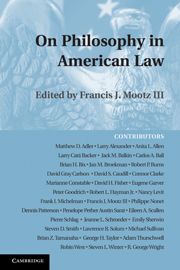Book contents
- Frontmatter
- Contents
- Introduction
- PART I KARL LLEWELLYN AND THE COURSE OF PHILOSOPHY IN AMERICAN LAW
- PART II PHILOSOPHICAL PERSPECTIVES ON LAW
- 7 Toward Normative Jurisprudence
- 8 Critical Legal Theory Today
- 9 Reviving the Subject of Law
- 10 Law and Creativity
- 11 The Stories of American Law
- PART III AREAS OF PHILOSOPHY AND THEIR RELATIONSHIP TO LAW
- PART IV PHILOSOPHICAL EXAMINATIONS OF LEGAL ISSUES
- PART V LAW, RHETORIC, AND PRACTICE THEORY
- PART VI QUESTIONING THE RELATIONSHIP BETWEEN PHILOSOPHY AND AMERICAN LAW
- PART VII COMMENTARIES
- Contributors and Selected Bibliography
- Name Index
8 - Critical Legal Theory Today
Published online by Cambridge University Press: 31 July 2009
- Frontmatter
- Contents
- Introduction
- PART I KARL LLEWELLYN AND THE COURSE OF PHILOSOPHY IN AMERICAN LAW
- PART II PHILOSOPHICAL PERSPECTIVES ON LAW
- 7 Toward Normative Jurisprudence
- 8 Critical Legal Theory Today
- 9 Reviving the Subject of Law
- 10 Law and Creativity
- 11 The Stories of American Law
- PART III AREAS OF PHILOSOPHY AND THEIR RELATIONSHIP TO LAW
- PART IV PHILOSOPHICAL EXAMINATIONS OF LEGAL ISSUES
- PART V LAW, RHETORIC, AND PRACTICE THEORY
- PART VI QUESTIONING THE RELATIONSHIP BETWEEN PHILOSOPHY AND AMERICAN LAW
- PART VII COMMENTARIES
- Contributors and Selected Bibliography
- Name Index
Summary
Among the many topics in the philosophy of law one has always been central to me: the relationship between law and justice. Law does many things: it creates institutions, facilitates transactions, gives incentives for socially beneficial behavior, deters misconduct, manufactures social realities. But one thing law does especially is legitimate power, both just power and unjust power. Law's ability to legitimate is the source of the nested opposition between law and justice. Law is never perfectly just – indeed, it is often not very just at all. And yet it is an indispensable condition for justice.
Legitimate, like sanction, is a Janus word, one that refers simultaneously to a concept and its opposite. To legitimate means to bring power under the rule of law so that it is (sufficiently) just, impartial, or otherwise worthy of respect. But to legitimate also means to apologize for or mystify the exercise of power so that it seems to be just, impartial, and worthy of respect, whether or not that is so.
The dual nature of legitimate is the central concern of a critical theory of law. Critical theories ask how law legitimates power in both senses of the word: how it shapes, channels, and restrains power and how it mystifies, disguises, and apologizes for it. In addition, a critical theory of law asks how the very acts of making, interpreting, and applying law produce and proliferate ever-new forms of power, both just and unjust.
- Type
- Chapter
- Information
- On Philosophy in American Law , pp. 64 - 72Publisher: Cambridge University PressPrint publication year: 2009
- 3
- Cited by



